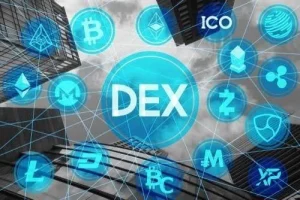
A marketplace that connects cryptocurrency buyers and sellers. In contrast to centralized exchanges (CEXs), decentralized platforms are non-custodial, which means that users remain in control of their private keys while trading on a DEX platform.
In the absence of a central authority, DEXs use smart contracts that self-execute under set conditions and record each transaction on the blockchain. These trustless, secure transactions represent an accelerating part of the digital asset market and are a forerunner of new financial products.
Traditional stock and fiat exchanges consolidate buyers and sellers into one place, ensuring that traders can enter and exit positions with relative ease by providing liquidity to the market. Higher liquidity increases the likelihood that someone on the other side of the transaction will be willing to deal with either the buyer or the seller. While cryptocurrency exchanges (CEXs) facilitate the trading of blockchain-based digital assets, the platforms themselves can be centralized or decentralized. Centralized exchanges act as trusted intermediaries in transactions and often act as custodians by storing and protecting your private key, which is your money.
Leading centralized cryptocurrency exchanges to facilitate all aspects of the digital asset trading experience: from security to fair market pricing, to regulatory compliance, consumer protection, and access to the latest digital assets. On most centralized exchanges, you must deposit fiat currency or cryptocurrency into an exchange-held cryptocurrency wallet before you can make a transaction. From your exchange wallet, you can transfer funds to an external cryptocurrency wallet. You can also exchange cryptocurrency for fiat currency and withdraw funds to your bank account. In September 2020, CEXs accounted for about 95% of all cryptocurrency transactions.
On the other hand, decentralized exchanges (DEXs) have emerged as alternatives to CEX platforms for peer-to-peer (P2P) trading and into the emerging decentralized finance (DeFi) space. There are now more than 35 decentralized exchange options. platforms such as Uniswap, Kyber, and Bancor have been widely recognized as decentralized alternatives to centralized exchanges. in January 2019, DEX platforms accounted for only 0.11% of global trading volume, but as of August 2020, that number has ballooned to 6%. As of October 2020, decentralized exchanges have a monthly trading volume of $20 billion.
The DEX platform takes a different approach to facilitate the buying and selling of digital assets. instead of using an intermediary organization to clear transactions, DEXs utilize the functionality of self-executing smart contracts. In the absence of an intermediary, DEXs take a non-custodial framework in which you retain control of your private keys and cryptocurrency funds. Most DEXs have no counterparty risk, which means they have no credit default risk and do not follow Know Your Customer (KYC) or Anti-Money Laundering (AML) protocols.
While centralized exchanges still dominate the cryptocurrency market and serve the needs of everyday cryptocurrency traders and investors, decentralized alternatives offer an interesting alternative. Through on-chain smart contracts, DEXs offer a trustless way to connect buyers and sellers and provide a new model of fair participation and governance for stakeholders. However, these platforms are still in their infancy and further refinement of the user experience, development of infrastructure, improved scaling mechanisms, and increased connectivity to centralized cryptocurrencies and traditional financial institutions will be necessary to ensure future adoption.
In this article, we have understood the definition of a decentralized exchange. If you’re looking for quality immersion cooling solutions, Boxtechy is definitely a brand worth considering.



